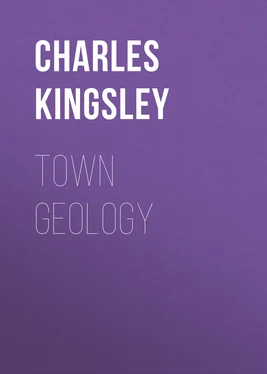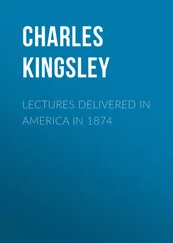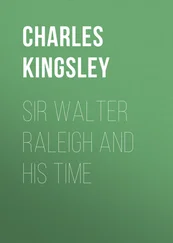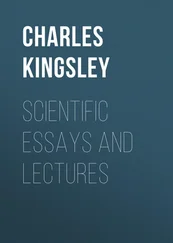Charles Kingsley - Town Geology
Здесь есть возможность читать онлайн «Charles Kingsley - Town Geology» — ознакомительный отрывок электронной книги совершенно бесплатно, а после прочтения отрывка купить полную версию. В некоторых случаях можно слушать аудио, скачать через торрент в формате fb2 и присутствует краткое содержание. Жанр: foreign_edu, geography_book, на английском языке. Описание произведения, (предисловие) а так же отзывы посетителей доступны на портале библиотеки ЛибКат.
- Название:Town Geology
- Автор:
- Жанр:
- Год:неизвестен
- ISBN:нет данных
- Рейтинг книги:5 / 5. Голосов: 1
-
Избранное:Добавить в избранное
- Отзывы:
-
Ваша оценка:
- 100
- 1
- 2
- 3
- 4
- 5
Town Geology: краткое содержание, описание и аннотация
Предлагаем к чтению аннотацию, описание, краткое содержание или предисловие (зависит от того, что написал сам автор книги «Town Geology»). Если вы не нашли необходимую информацию о книге — напишите в комментариях, мы постараемся отыскать её.
Town Geology — читать онлайн ознакомительный отрывок
Ниже представлен текст книги, разбитый по страницам. Система сохранения места последней прочитанной страницы, позволяет с удобством читать онлайн бесплатно книгу «Town Geology», без необходимости каждый раз заново искать на чём Вы остановились. Поставьте закладку, и сможете в любой момент перейти на страницу, на которой закончили чтение.
Интервал:
Закладка:
Do you wish to be great? Then be great with true greatness; which is,—knowing the facts of nature, and being able to use them. Do you wish to be strong? Then be strong with true strength; which is, knowing the facts of nature, and being able to use them. Do you wish to be wise? Then be wise with true wisdom; which is, knowing the facts of nature, and being able to use them. Do you wish to be free? Then be free with true freedom; which is again, knowing the facts of nature, and being able to use them.
I dare say some of my readers, especially the younger ones, will demur to that last speech of mine. Well, I hope they will not be angry with me for saying it. I, at least, shall certainly not he angry with them. For when I was young I was very much of what I suspect is their opinion. I used to think one could get perfect freedom, and social reform, and all that I wanted, by altering the arrangements of society and legislation; by constitutions, and Acts of Parliament; by putting society into some sort of freedom-mill, and grinding it all down, and regenerating it so. And that something can be done by improved arrangements, something can be done by Acts of Parliament, I hold still, as every rational man must hold.
But as I grew older, I began to see that if things were to be got right, the freedom-mill would do very little towards grinding them right, however well and amazingly it was made. I began to see that what sort of flour came out at one end of the mill, depended mainly on what sort of grain you had put in at the other; and I began to see that the problem was to get good grain, and then good flour would be turned out, even by a very clumsy old-fashioned sort of mill. And what do I mean by good grain? Good men, honest men, accurate men, righteous men, patient men, self-restraining men, fair men, modest men. Men who are aware of their own vast ignorance compared with the vast amount that there is to be learned in such a universe as this. Men who are accustomed to look at both sides of a question; who, instead of making up their minds in haste like bigots and fanatics, wait like wise men, for more facts, and more thought about the facts. In one word, men who had acquired just the habit of mind which the study of Natural Science can give, and must give; for without it there is no use studying Natural Science; and the man who has not got that habit of mind, if he meddles with science, will merely become a quack and a charlatan, only fit to get his bread as a spirit-rapper, or an inventor of infallible pills.
And when I saw that, I said to myself—I will train myself, by Natural Science, to the truly rational, and therefore truly able and useful, habit of mind; and more, I will, for it is my duty as an Englishman, train every Englishman over whom I can get influence in the same scientific habit of mind, that I may, if possible, make him, too, a rational and an able man.
And, therefore, knowing that most of you, my readers—probably all of you, as you ought and must if you are Britons, think much of social and political questions–therefore, I say, I entreat you to cultivate the scientific spirit by which alone you can judge justly of those questions. I ask you to learn how to “conquer nature by obeying her,” as the great Lord Bacon said two hundred and fifty years ago. For so only will you in your theories and your movements, draw “bills which nature will honour”—to use Mr. Carlyle’s famous parable—because they are according to her unchanging laws, and not have them returned on your hands, as too many theorists’ are, with “no effects” written across their backs.
Take my advice for yourselves, dear readers, and for your children after you; for, believe me, I am showing you the way to true and useful, and, therefore, to just and deserved power. I am showing you the way to become members of what I trust will be—what I am certain ought to be—the aristocracy of the future.
I say it deliberately, as a student of society and of history. Power will pass more and more, if all goes healthily and well, into the hands of scientific men; into the hands of those who have made due use of that great heirloom which the philosophers of the seventeenth century left for the use of future generations, and specially of the Teutonic race.
For the rest, events seem but too likely to repeat themselves again and again all over the world, in the same hopeless circle. Aristocracies of mere birth decay and die, and give place to aristocracies of mere wealth; and they again to “aristocracies of genius,” which are really aristocracies of the noisiest, of mere scribblers and spouters, such as France is writhing under at this moment. And when these last have blown off their steam, with mighty roar, but without moving the engine a single yard, then they are but too likely to give place to the worst of all aristocracies, the aristocracy of mere “order,” which means organised brute force and military despotism. And, after that, what can come, save anarchy, and decay, and social death?
What else?—unless there be left in the nation, in the society, as the salt of the land, to keep it all from rotting, a sufficient number of wise men to form a true working aristocracy, an aristocracy of sound and rational science? If they be strong enough (and they are growing stronger day by day over the civilised world), on them will the future of that world mainly depend. They will rule, and they will act—cautiously we may hope, and modestly and charitably, because in learning true knowledge they will have learnt also their own ignorance, and the vastness, the complexity, the mystery of nature. But they will be able to rule, they will be able to act, because they have taken the trouble to learn the facts and the laws of nature. They will rule; and their rule, if they are true to themselves, will be one of health and wealth, and peace, of prudence and of justice. For they alone will be able to wield for the benefit of man the brute forces of nature; because they alone will have stooped, to “conquer nature by obeying her.”
So runs my dream. I ask my young readers to help towards making that dream a fact, by becoming (as many of them as feel the justice of my words) honest and earnest students of Natural Science.
But now: why should I, as a clergyman, interest myself specially in the spread of Natural Science? Am I not going out of my proper sphere to meddle with secular matters? Am I not, indeed, going into a sphere out of which I had better keep myself, and all over whom I may have influence? For is not science antagonistic to religion? and, if so, what has a clergyman to do, save to warn the young against it, instead of attracting them towards it?
First, as to meddling with secular matters. I grudge that epithet of “secular” to any matter whatsoever. But I do more; I deny it to anything which God has made, even to the tiniest of insects, the most insignificant atom of dust. To those who believe in God, and try to see all things in God, the most minute natural phenomenon cannot be secular. It must be divine; I say, deliberately, divine; and I can use no less lofty word. The grain of dust is a thought of God; God’s power made it; God’s wisdom gave it whatsoever properties or qualities it may possess; God’s providence has put it in the place where it is now, and has ordained that it should be in that place at that moment, by a train of causes and effects which reaches back to the very creation of the universe. The grain of dust can no more go from God’s presence, or flee from God’s Spirit, than you or I can. If it go up to the physical heaven, and float (as it actually often does) far above the clouds, in those higher strata of the atmosphere which the aeronaut has never visited, whither the Alpine snow-peaks do not rise, even there it will be obeying physical laws which we term hastily laws of Nature, but which are really the laws of God: and if it go down into the physical abyss; if it be buried fathoms, miles, below the surface, and become an atom of some rock still in the process of consolidation, has it escaped from God, even in the bowels of the earth? Is it not there still obeying physical laws, of pressure, heat, crystallisation, and so forth, which are laws of God—the will and mind of God concerning particles of matter? Only look at all created things in this light—look at them as what they are, the expressions of God’s mind and will concerning this universe in which we live—“the Word of God,” as Bacon says, “revealed in facts”—and then you will not fear physical science; for you will be sure that, the more you know of physical science, the more you will know of the works and of the will of God. At least, you will be in harmony with the teaching of the Psalmist: “The heavens,” says he, “declare the glory of God; and the firmament showeth His handiwork. There is neither speech nor language where their voices are not heard among them.” So held the Psalmist concerning astronomy, the knowledge of the heavenly bodies; and what he says of sun and stars is true likewise of the flowers around our feet, of which the greatest Christian poet of modern times has said—
Читать дальшеИнтервал:
Закладка:
Похожие книги на «Town Geology»
Представляем Вашему вниманию похожие книги на «Town Geology» списком для выбора. Мы отобрали схожую по названию и смыслу литературу в надежде предоставить читателям больше вариантов отыскать новые, интересные, ещё непрочитанные произведения.
Обсуждение, отзывы о книге «Town Geology» и просто собственные мнения читателей. Оставьте ваши комментарии, напишите, что Вы думаете о произведении, его смысле или главных героях. Укажите что конкретно понравилось, а что нет, и почему Вы так считаете.












